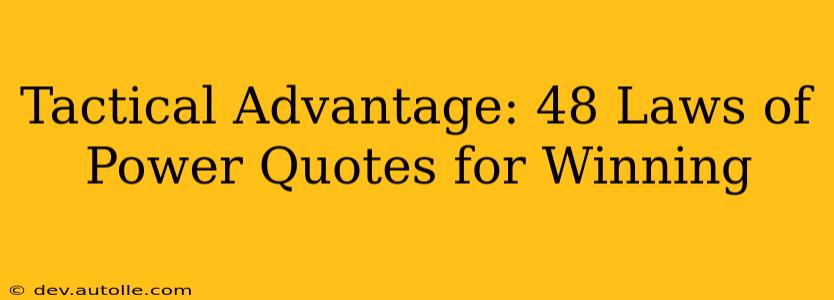Tactical Advantage: 48 Laws of Power Quotes for Winning
Robert Greene's 48 Laws of Power has become a modern classic, offering a Machiavellian yet insightful guide to navigating power dynamics. While controversial, its core principles—understanding human nature, strategic maneuvering, and the art of influence—can be adapted for achieving personal and professional success. This article explores key quotes from the book, revealing their tactical advantages and providing practical applications for winning in various life scenarios. We'll delve into the wisdom within, focusing on how these seemingly cynical maxims can be employed ethically and effectively.
Understanding the Nuances: Power Isn't Always About Domination
Before we dissect the quotes, it's crucial to understand that Greene's book isn't a guide to ruthless exploitation. Instead, it's a study of power dynamics, offering strategies for self-preservation and advancement in a complex world. The "laws" are tools; their ethical application is entirely up to the reader. Many quotes highlight the importance of perception, manipulation of information, and understanding the motivations of others. This knowledge can be harnessed for positive, constructive purposes.
Key Quotes and Their Tactical Advantages:
1. "Never put too much trust in friends, learn how to use enemies."
This quote highlights the often overlooked strategic value of adversaries. Instead of viewing enemies solely as obstacles, consider how their actions and motivations might offer valuable insights or even unintended advantages. Analyzing their strategies can strengthen your own.
2. "Conceal your intentions."
Transparency, while often valued, can be a significant weakness. Revealing your plans prematurely allows opponents to prepare counter-strategies. Maintaining a level of mystery and ambiguity creates a powerful advantage. This doesn’t mean being deceitful, but rather, being strategic about the information you share.
3. "Always say less than necessary."
The power of silence is underestimated. Speaking less forces others to fill the void, often revealing their own intentions and weaknesses. Your measured words carry more weight when you're not constantly talking.
4. "Sow the seeds of doubt; doubt is the most destructive force in human relations."
This isn't about spreading malicious rumors. However, subtly challenging assumptions and prompting critical thinking can disrupt the plans of opponents. It's about fostering uncertainty in the right circumstances, not creating chaos.
5. "Learn to keep people dependent on you."
This doesn't imply manipulative control. Instead, it points towards developing valuable skills and expertise that others rely on. By becoming indispensable, you secure your position and influence. It encourages self-improvement and becoming a valuable asset.
What are the main criticisms of the 48 Laws of Power?
The primary criticism of 48 Laws of Power centers on its amorality. The book presents strategies for gaining power without explicitly addressing ethical considerations. Critics argue that the laws can be easily misused, leading to manipulation and exploitation. The book is often seen as a cynical view of human interaction, lacking empathy and compassion. It’s important to remember that while understanding the tactics is valuable, applying them responsibly is crucial.
How can I use the 48 Laws of Power ethically?
The ethical application of the 48 Laws of Power lies in self-awareness and intention. Instead of using the laws to manipulate and control others, focus on self-improvement, strategic planning, and understanding the complexities of human interactions. Use the knowledge to become a more effective leader, communicator, and negotiator—always prioritizing fairness and integrity.
Are the 48 Laws of Power still relevant today?
Absolutely. Human nature hasn't changed. Understanding power dynamics, influence, and strategic maneuvering remains crucial in today's complex world. The principles are timeless; the tactics need to be adapted for the modern context.
Can I apply the 48 Laws of Power in my personal life?
While the book primarily focuses on professional settings, many of the laws are equally applicable to personal relationships. Understanding how to manage conflict, communicate effectively, and navigate social dynamics can improve personal well-being and lead to more fulfilling relationships. However, remember to always prioritize empathy and respect.
By understanding the nuances and ethically applying the wisdom within 48 Laws of Power, one can indeed gain a tactical advantage—not through manipulation and control, but through self-awareness, strategic thinking, and an astute understanding of human behavior. The book serves as a powerful tool, but its effective and ethical application rests entirely with the reader.

